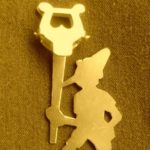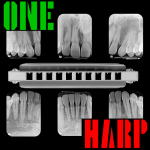Cause for going out of tune
Tagged: flat notes, reed gap, tuning
- This topic has 12 replies, 6 voices, and was last updated 8 years, 10 months ago by
 Melodica-Me.
Melodica-Me.
-
AuthorPosts
-
June 22, 2014 at 1:24 pm #2587
 LowboyParticipant
LowboyParticipantHi Alan and Others,
I have a tuning question for you. Last week I went to a blues jam with my two Yamaha pianicas. It was a loud electric jam and I played very loud, loud as possible at some points. The next time I played these pianicas, the high B flat note on both of them played flat. I play this note a lot in several keys and often play it the loudest.
So my question is, what is the mechanism for these notes going flat? Clearly I did not add or take away metal (weight) from the reeds. And when I disassembled the P-25F, the reed gap did not see too far out of place.
I tried adjusting the reed gap, but it did not seem to make any difference.
So how can hard playing do this? No change in reed weight, and no gross change in reed gap, yet the note plays flat?
Any thoughts on this and how to fix it? Thanks for you help.
Regards,
Lowboy
June 22, 2014 at 3:14 pm #2588 Alan BrintonParticipant
Alan BrintonParticipantI’m afraid I don’t have much to offer on this one. I don’t play loud, but in my experience some notes tend to go flat over time and a need for re-tuning a note is generally because it’s flat. I don’t understand why or how this happens. In your case, I guess you know why but not how. I would tune the reed and see whether that fixes the problem or whether it happens again. On one of my P32Ds, the middle G suddenly went seriously flat. I tuned the reed up, and it proceeded to go flat again the next day. I decided there must be a hairline fracture in the reed. I hope that’s not your problem. It’s interesting that the same thing happened to two identical melodicas under the same conditions. If you add three more P-25Fs, you’ll have a scientific experiment — sorry, I know this is no joking matter.
June 22, 2014 at 6:54 pm #2589 Melodica-MeParticipant
Melodica-MeParticipantLowboy, unfortunately if your reed continues to go out of tune, it’s time to replace the read, in your case the read plate. I am not sure what the cost is to replace, maybe Allen can give you a clue. If the melodica was not to expensive it may be cheaper to buy another than to order a plate pay for shipping and the time to replace it. Though it may be a good learning project.
Melodica-MeJune 22, 2014 at 8:33 pm #2591 Alan BrintonParticipant
Alan BrintonParticipantInformation about ordering reed plates for all the Yamahas is in Troy’s thread om Yamaha P-37D Reed Plates under Melodica Construction, Repair, and Maintenance. Unfortunately the cost (USA) is $25 + shipping for each plate. It’s very bad news, though, if both those B flat reeds have been destroyed by how you want to play, Lowboy.
I was just doing some Googling about harmonica reeds and found the following, which explains why reeds fail and also comments about possible implications for your style of playing. He gives Junior Wells as an example of a harmonica player “who seems to be playing loud but actually doesn’t.” If you tune the reed and then avoid playing it really loud for a while, you should find out whether or not it has failed. If it goes flat again, you’ll know it has failed; if not, you’ll know it has just been flattened by hard playing. My flat G reed eventually snapped when I was fiddling with it. It broke at the base. Maybe it’s a change at the base of the reed, where it connects, that has made your note flat. Maybe it has bent slightly up or slightly down. If you tune it and keep doing what caused that change, it will go flat again and so on until it eventually snaps.
June 22, 2014 at 8:36 pm #2592 Alan BrintonParticipant
Alan BrintonParticipantThis seems to confirm what I was just saying about the base of the reed:
http://www.bluesharmonica.com/play_softly_save_harmonicas
Playing loud is the #1 killer of harmonicas.
Each reed is a spring… a spring that travels in and out of the reed slot 880 times per second for a 7+ on your A Harmonica (1,760 for the 10+!). When playing louder, the reed doesn’t travel faster (faster vibration equals a different pitch), it travels farther. The louder you play, the farther the reed travels in its arc and places stress on the base of the reed (this is where a reed breaks… right at the hinge… near the rivet).
June 22, 2014 at 10:47 pm #2593 DarenKeymaster
DarenKeymasterI don’t play particularly loudly, but I find a certain few reeds tend to fail first. These are ones that tend to come up a lot in the tunes I play, and they’re around the 3rd F sharp on the P37D.
You know when a reed has failed because it rapidly drops 20-30 cents. If you tune it back up, it rapidly drops again and eventually snaps. When I hear this happening now, I replace the offending reed plate straight away.
Many harmonica players have learnt to remove the rivet that attached the reed to the plate so they can fit a replacement reed. This saves the cost of a whole new plate for one faulty reed. There’s a few youtube videos explaining how to do this. I haven’t tried it yet, but I will soon.
A video from Hohner:
June 23, 2014 at 9:00 am #2596 LowboyParticipant
LowboyParticipantHi Guys,
Thanks for all of the information. I think you have nailed it. As it turns out, I have damaged the reed in the P-25F trying to adjust the reed gap. I will try tuning the P-32D when I get a chance and let you know if it stays in tune.
I will probably order reed plates from Yamaha. If you spend more than fifty dollars at their online parts store, they ship for free. So two plates and a mouthpiece will get me free shipping.
One reed plate without shipping is about half the cost of a P-25F, so it is probably worth it.
Well, I learned an important lesson. I normally do not play really really loud. Just loud. But with crappy monitors at the blues jam, I had to play really really loud to hear myself. It seems good monitors are a requirement when playing live. I am still looking around for an amp to use as a monitor. But I have yet to make it to Guitar Center to try various amps with my instrument.
Thanks again for your help.
Regards,
Tom
June 24, 2014 at 7:41 pm #2621 OneHarpParticipant
OneHarpParticipantHiya! Sorry I’m a little late to this thread, but I come from the wide world of Harmonicas, where we blow out reeds all the time! 🙂 Yes, reed go flat when they start to develop “stress fractures” usually near the base of the reed (close to the rivet pad). Typically, one can retune a flat reed once or twice to get some more playing time out of it, but it is indeed the sign of death for that reed, and it will need to be replaced. While that might sound daunting, it’s actually rather easy. Both Hohner and Suzuki make reed replacement tool kits (as well as the Harmonica companies Seydel and Herring), and but you can also send in your busted reed plates for repair by the manufacturer (I know that at least Hohner and Suzuki do this, and have great repair techs). I’m not sure if Hohner/suzuki et al sell individual reeds for Melodicas, but they do so for Harmonicas. I have a “bone yard” of old harmonica reedplates from which I salvage my donor reeds, though. I made my own set of reed replacement tools, using an “eylet” tool from Harbor freight, which I filed down to the same diameter as the reed rivets. Basically, I jsut line it up, squeeze, and the rivet pops out. I then put new reed on re-using the old rivet, and setting it with a hammer, nailset, and small anvil. Takes me about 5 minutes to replace a reed, but I don’t blow them out so much any more now that I’ve learned to better control my breath pressure. Hope that helps!
June 27, 2014 at 10:25 am #2634 LowboyParticipant
LowboyParticipantThanks OneHarp.
Incredibly useful information and lots of it. I can see there is much to learn and explore in terms of maintaining my melodicas.
Given my efforts in the blues arena, I am sure I will have some questions for you going forward. Thanks again.
Regards,
Lowboy
May 28, 2015 at 7:50 pm #5356Luis Resto
ParticipantHello,
I’m new here and appreciate all the info I’ve obtained already. Perhaps you can help me out with my primary question related to your topic, and a second that will follow, and that is replacing a reed or reed plate. I own a Hammond 44 that has a high b that consistently goes flat even after tuning leading me to wanting to replace it or the plate. Melodica-Me, I read a post of yours telling of an online store in Japan you have ordered plates from. I couldn’t figure out how to message you to ask about an address or link. So to recap, two questions, a source for reed plates for my Hammond 44 and how does one message members in melodicaworld? Thanks allMay 28, 2015 at 10:37 pm #5360 Melodica-MeParticipant
Melodica-MeParticipantHello Luis, I purchased the reed plates and gasket on line from West Co LTD.on rakutenglobel
Email
westmusic_2@shop.rakuten.co.jpAtt: Go Kawamoto
Website
http:/www.rakuten.co.jp/westmusic/Don’t forget to purchase the gasket, you may not need it but if yours tears you will have to repair or replace it. I only replaced the reed plate that had the bad reed. You do not have to replace them all. and I did not hear any difference in sound between reed plates. But listen to yours and see if you need to change all three.
Good Luck
Melodica-Me
Monsters of MelodicaMay 28, 2015 at 11:26 pm #5361Luis Resto
ParticipantThank you. I’ve emailed Mr. Kawamoto
May 29, 2015 at 11:39 pm #5365 Melodica-MeParticipant
Melodica-MeParticipantGreat, they were very helpful. you can always get a hold of me here or on Facebook “Monsters of Melodica”.
Thanks
Oscar
-
AuthorPosts
- You must be logged in to reply to this topic.
